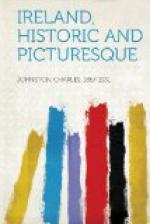We have seen Cailte with Ossin following Find in his wild ride through the mountains of Killarney, and to Cailte is attributed the saying that echoes down the ages: “There are things that our poor wit knows nothing off!” Cailte was a great lover of the supernatural, yet there was in him also a vein of sentiment, shown in his poem on the death of Clidna—“Clidna the fair-haired, long to be remembered,” who was tragically drowned at Glandore harbor in the south, and whose sad wraith still moans upon the bar, in hours of fate for the people of Erin.
In a gayer vein is the poem of Fergus the Eloquent, who sang the legend of Tipra Seangarmna, the Fountain of the Feale River, which flows westward to the sea from the mountains north of Killarney. The river rises among precipices, gloomy caverns and ravines, and passes through vales full of mysterious echoes amid mist-shrouded hills. There, as Fergus sings, were Ossin and his following hunting, when certain ominous fair women lured them to a cave,—women who were but insubstantial wraiths,—to hold them captive till the seasons ran full circle, summer giving place again to winter and spring. But Ossin, being himself of more than human wisdom, found a way to trick the spirits; for daily he cut chips from his spear and sent them floating down the spring, till Find at last saw them, and knew the tokens as Ossin’s, and, coming, delivered his son from durance among ghosts.
The great romantic theme of the time binds the name of Find, son of Cumal, with that of Cormac, son of Art, and grandson of Conn of the Five-score Battles. This Cormac was himself a notable man of wisdom, and here are some of the Precepts he taught to Cairbre, his son:
“O grandson of Conn, O Cormac,” Cairbre asked him, “what is good for a king?”
“This is plain,” answered Cormac. “It is good for him to have patience and not to dispute, self-government without anger, affability without haughtiness, diligent attention to history, strict observance of covenants and agreements, justice tempered by mercy in the execution of the laws. It is good for him to make fertile land, to invite ships, to import jewels of price from across the sea, to purchase and distribute raiment, to keep vigorous swordsmen who may protect his territory, to make war beyond his territory, to attend to the sick, to discipline his soldiers. Let him enforce fear, let him perfect peace, let him give mead and wine, let him pronounce just judgments of light, let him speak all truth, for it is through the truth of a king that God gives favorable seasons.”
“O grandson of Conn, O Cormac,” Cairbre again asked him, “what is good for the welfare of a country?”
“This is plain,” answered Cormac. “Frequent assemblies of wise and good men to investigate its affairs, to abolish every evil and retain every wholesome institution, to attend to the precepts of the seniors; let every assembly be convened according to the law, let the law be in the hands of the noblest, let the chieftains be upright and unwilling to oppress the poor.”




